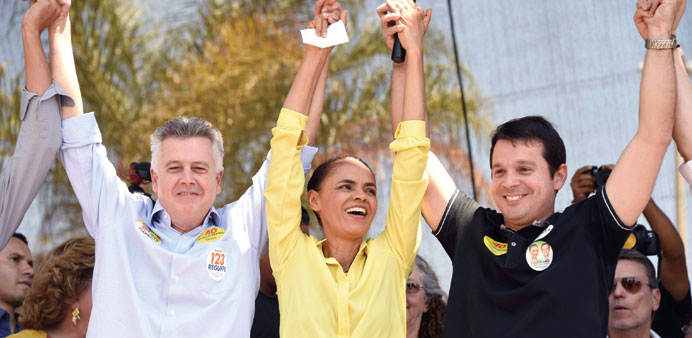Marina Silva, presidential candidate of the Brazilian Socialist Party (PSB), her vice presidential candidate, Beto Albuquerque and Distrito Federal’s governor candidate for the PSB, Rodrigo Rollemberg attend a campaign rally in Ceilandia, Brasilia, Brazil, yesterday.
Reuters/Brasilia
Marina Silva would push for large budget cuts and end a central bank foreign exchange programme aimed at supporting the currency if she is elected Brazil’s next president in October, a senior economic adviser said.
Alexandre Rands, an economist who helped draft Silva’s economic plan, said she could cut up to 100bn reais ($43bn) - or about 2% of gross domestic product - in budget spending next year to send a strong signal to investors worried about the deterioration of public finances.
“Our priority is not to cut spending for the sake of it. Our priority is to control inflation in order to create an environment that will allow Brazil to grow more,” he said in an interview that provided some of the most specific guidance yet about Silva’s financial policies.
Silva, an environmentalist whom polls show is running neck-to-neck with President Dilma Rousseff in a likely runoff next month, has encouraged many investors with her market-friendly economic platform, which includes giving the central bank full independence.
A sluggish economy and growing fiscal deficits during Rousseff’s four years in office has cost Brazil a downgrade of its debt rating and scared off some investors who say the leftist leader is too interventionist.
Rands said Silva would eliminate many of the economic distortions that have dragged the once-booming Brazilian economy into recession.
He mentioned the central bank’s currency intervention scheme, which has kept the real stronger since last year, as one of those distortions that will be corrected under Silva.
“That does not mean that you cannot carry out small, temporary actions to eliminate volatility,” Rands said.
Since last August, Brazil’s central bank has intervened daily in the foreign exchange market by selling currency swaps, derivatives designed to support the real.
Rands, who runs an economic consultancy in the northeastern state of Pernambuco, is part of Silva’s team of economic advisers, which also includes well-known economist Eduardo Giannetti da Fonseca.
He said the budget cuts would spare initiatives such as the Bolsa Familia welfare programme for poor families, focusing instead on spending for projects in lawmakers’ districts.
“There is a lot of fat that can be cut and the Marina (Silva) camp is sending positive signals on that fiscal front,” said Alex Agostini, chief economist with Austin Rating. “It could generate a confidence shock that will allow the economy to grow more in the future.”
Rands said a Silva administration would also aim to lower the centre of Brazil’s official inflation target below the current 4.5%.
Economists complain that such a wide target range has allowed politicians to keep inflation high, hurting retailers and dragging down investments in Latin America’s largest economy.
He said the campaign’s economic team is debating whether to keep the current leadership at the central bank or opt for a new team during the transition toward full independence if she is elected.
Rands was a macroeconomics classmate of current central bank chief Alexandre Tombini at the University of Illinois, Urbana-Champaign.
“Brazil has a credibility problem. Once Rousseff is out of power part of that problem will be resolved,” Rands said.

